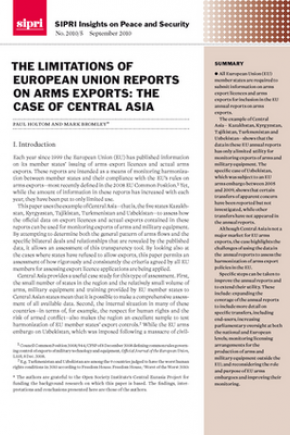The Limitations of European Union Reports on Arms Exports: The Case of Central Asia
All European Union (EU) member states are required to submit information on arms export licences and arms exports for inclusion in the EU annual reports on arms exports.
The example of Central Asia—Kazakhstan, Kyrgyzstan, Tajikistan, Turkmenistan and Uzbekistan—shows that the data in these EU annual reports has only a limited utility for monitoring exports of arms and military equipment. The specific case of Uzbekistan, which was subject to an EU arms embargo between 2005 and 2009, shows that certain transfers of apparent concern have been reported but not investigated, while other transfers have not appeared in the annual reports.
Although Central Asia is not a major market for EU arms exports, the case highlights the challenges of using the data in the annual reports to assess the harmonization of arms export policies in the EU.
Specific steps can be taken to improve the annual reports and to extend their utility. These include: expanding the coverage of the annual reports to include more detail on specific transfers, including end-users; increasing parliamentary oversight at both the national and European levels; monitoring licensing arrangements for the production of arms and military equipment outside the EU; and reconsidering the role and purpose of EU arms embargoes and improving their monitoring.
I. Introduction
II. European Union arms export controls challenges
III. The example of Central Asia
IV. The arms embargo on Uzbekistan, 2005-2009
V. Challenges in the use of data from European Union annual reports
VI. Conclusions and recommendations


